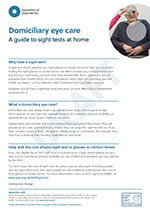Domiciliary eye care
A guide to sight tests at home
Why have a sight test?
A sight test checks whether you need glasses or contact lenses to help you see better. Having the right glasses or contact lenses can often increase your independence and improve your well-being, and can even help prevent falls. But a sight test is also an important eye-health check, and can sometimes detect signs of underlying general health conditions, such as diabetes, high cholesterol and high blood pressure.
Everyone should have a sight test every two years, or more often if your optometrist recommends it.
What is domiciliary eye care?
Domiciliary eye care simply means eye care at home. If you cannot get to a High Street optician on your own, for example because of a mental or physical disability, an optometrist can come to your home or day centre.
Optometrists who provide domiciliary services have equipment that means they can provide an accurate sight test in your home. They can adapt the sight test for you if you have complex needs or if you struggle to communicate or understand, for example if you have had a stroke or have learning disabilities or dementia.
Help with the cost of your sight test or glasses or contact lenses
If you are eligible for an NHS sight test but cannot go to a High Street optician on your own due to a mental or physical disability, you are entitled to domiciliary eye care paid for by the NHS.
The NHS covers the cost of sight tests for everyone in Scotland, and for various groups of people in other parts of the UK, including people who are aged 60 or over, and some people are also entitled to help towards the cost of their glasses or contact lenses. For more information, read our NHS sight test leaflets.
How to book a domiciliary sight test
Many High Street opticians provide domiciliary eye care and you can choose who gives you your sight test. If you move into a care home you may be able to keep your regular optician. You don’t have to see an optician that the care home chooses. You can contact your local practice direct to find out if they will visit you, or you can visit our find an optometrist page to find an optometrist who provides domiciliary eye care. You, a relative or your main carer must ask for a domiciliary sight test.
What happens during the sight test?
The optometrist will assess what you can see (close-up and in the distance), usually using special charts of symbols or letters. They will carry out a series of tests using different lenses to work out whether you need glasses or, if you already have glasses, whether your prescription needs changing. They will also look at the inside and outside of your eyes to check they are healthy.
Occasionally, the optometrist may need to put drops in your eyes to get a better view of the back of your eye. Sometimes it may be necessary to check your peripheral (side) vision using special equipment, and you may also be offered an eye-pressure test. These tests can help detect treatable eye conditions such as glaucoma, which may go unnoticed if you don’t have regular sight tests.
None of the procedures hurt, but some people may find them uncomfortable. If you are worried about any part of the sight test, you can discuss this with your optometrist so they can tailor the test to you. If you have specific needs, it can be helpful to tell the optometrist about these beforehand.
After the sight test
After your sight test, the optometrist will talk through the results with you and you will have the opportunity to ask any questions you have. Your optometrist will tell you if you need glasses and will give you a written statement about your results which includes your new prescription if you need one. You do not have to buy new glasses after a sight test, or buy them from the optometrist who provided the sight test, but it’s usually easier to sort out any problems if you buy your glasses from the optometrist who provided your sight test.
The optometrist may give you advice such as how often you should have a sight test or how to keep your eyes healthy. If they find something which you need further medical checks for, they will write to your doctor or the eye hospital for you.
Resourses for your practice
You can download our patient leaflet on domiciliary eye care.
If you're a practitioner, we recommend that you use this information, following a suitable examination, to reinforce advice given to the patient who has symptoms of allergic conjunctivitis.
For more information on eye health, go to our For patients section.


